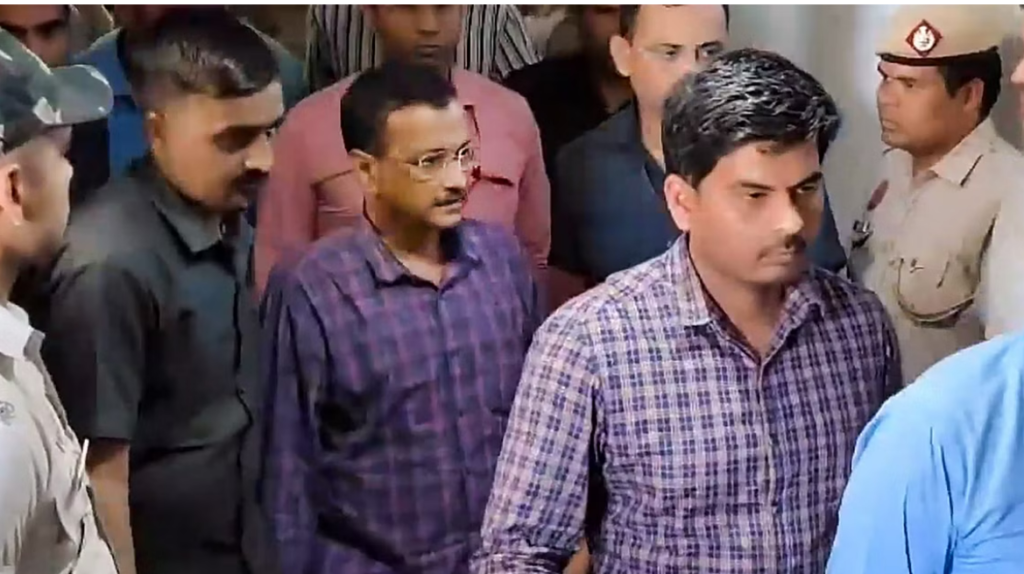Delhi Court Extends ED Custody of Arvind Kejriwal: In a significant turn of events, Delhi Chief Minister Arvind Kejriwal’s custody under the Enforcement Directorate (ED) has been extended until April 1 by the Rouse Avenue Court. The decision came after the conclusion of his custodial remand, amidst a flurry of legal battles and political uproar surrounding his arrest in connection with the alleged liquor policy scam.
Court extends ED custody of Delhi Chief Minister Arvind Kejriwal till April 1
— Press Trust of India (@PTI_News) March 28, 2024
Legal Maneuvers and High Court Dismissal
Earlier attempts to challenge Kejriwal’s arrest met with obstacles, as the Delhi High Court declined to intervene in the matter. Despite efforts to secure relief, including a plea seeking his release from ED custody, the court remained steadfast, scheduling the next hearing for April 3.

Additionally, a public interest litigation (PIL) seeking Kejriwal’s removal and prevention of issuing orders while in ED custody was dismissed, citing violations of legal framework and principles of fair investigation.
AAP Allegations and Counter-Arguments
Amidst the legal proceedings, the Aam Aadmi Party (AAP) launched protests, alleging politically motivated actions by the ED. AAP leaders, including Kejriwal’s wife Sunita Kejriwal, raised questions about the source and destination of funds related to the alleged scam. AAP’s claims were bolstered by assertions that the ED failed to provide satisfactory responses to queries raised by Kejriwal’s legal team, further fueling allegations of an agenda-driven arrest.
ED’s Case and Kejriwal’s Defense
The ED, however, presented its case, alleging that Kejriwal provided evasive replies and withheld crucial information, including passwords to digital devices. Kejriwal, in response, challenged the legitimacy of his arrest, citing lack of concrete evidence and accusing the ED of attempting to stifle his political party. He vehemently defended himself in court, pointing out discrepancies in witness statements and questioning the motives behind his detention.
Political Fallout and International Scrutiny
Kejriwal’s arrest reverberated beyond India’s borders, drawing attention from the United States, which called for fair and transparent legal processes. However, India lodged a strong protest against external interference, reaffirming its commitment to independent judiciary and democratic principles. The geopolitical tension surrounding Kejriwal’s arrest underscores the broader implications of his legal battle.
Protests and Public Sentiment
The extension of Kejriwal’s custody sparked renewed protests and outcry among AAP supporters, who perceive his arrest as an attack on democratic values. The ongoing saga has further polarized public opinion, with supporters rallying behind Kejriwal while critics question the integrity of his leadership. Amidst the political turmoil, Kejriwal’s wife hinted at a potential exposé, promising revelations related to the alleged liquor policy scam.
Future Implications for AAP
The outcome of Kejriwal’s legal battle holds significant ramifications for the AAP, potentially shaping its future trajectory. With Kejriwal’s leadership under scrutiny and the party facing an existential crisis, its ability to weather the storm remains uncertain. The outcome of the legal proceedings may influence voter sentiment, particularly in states like Punjab, where AAP’s presence looms large.
Conclusion
As the legal saga unfolds, Arvind Kejriwal’s custody extension underscores the complexities of India’s political landscape. Amidst allegations of political vendetta and judicial scrutiny, the fate of the Delhi Chief Minister hangs in the balance. As the nation awaits further developments, the implications of Kejriwal’s arrest reverberate both domestically and internationally, shaping the discourse on democracy, governance, and the rule of law.
